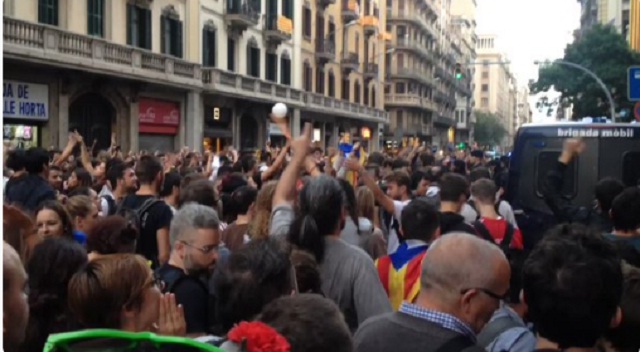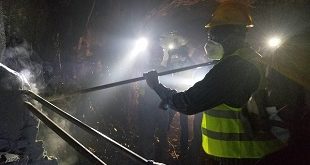
Madrid, Spain | AFP | Spain moved into uncharted waters after leaders in the wealthy Catalonia region signalled they may declare independence following a banned secession referendum which was marred by police violence.
Catalonia’s leader Carles Puigdemont said the region had won the right to break away from Spain after 90 percent of voters taking part in Sunday’s vote backed independence, but the central government in Madrid has vowed to stop this from happening.
How the Catalan crisis could cause the collapse of Spain https://t.co/wWsC0QvHUD
— The Independent (@Independent) October 2, 2017
The following are possible scenarios for what may happen next:
-Declaration of independence-
Puigdemont, who came to power in January 2016 after pro-separatist parties won a narrow majority in the Catalan regional parliament, repeated until the day of the referendum that his government would declare independence if the “yes” camp won.
While 90 percent voted for independence, the turnout was just 42.3 percent as most of those who opposed secession stayed at home. Police also closed dozens of polling stations and seized ballot boxes to prevent the vote, hindering participation.
Puigdemont has said he will now present the results to the region’s parliament, which has the power to adopt a motion of independence.
Thousands took to Barcelona’s streets in MASSIVE pro-Catalan #referendum #protests https://t.co/kh92TAKY70#Catalonia #Barcelona pic.twitter.com/LJxEroS93M
— RT (@RT_com) September 29, 2017
Oriol Bartomeus, a political scientist at the Autonomous University of Barcelona, said the separatists were “trapped” by this referendum and would be forced to keep their promise to abide by its results.
“It is like a snowball that is rolling down a mountain, it gets faster and faster and nobody can stop it,” he told AFP.
– Suspension of Catalan autonomy-
Madrid could invoke the never-used Article 155 of the Spanish constitution, which allows Spain’s central government to take over the powers of a regional government that is acting against the national interest, to block an independence declaration.
If Catalonia declared independence “the state would be forced to intervene” by using this article, said Javier Perez Royo, a constitutional law professor at the University of Seville.
It is seen as a last resort, but on Monday Spain’s Justice Minister Rafael Catala refused to rule it out, saying the government would “do everything within the law” to block an independence declaration.
If Madrid used this power, huge protests would probably erupt across Catalonia, similar to those that followed the arrest on September 21 of 14 top Catalan government officials over their role in preparing the referendum.
Amid protests over violence by Spanish police, the next steps are uncertain but may include a general strike. https://t.co/XaZa3deAD5
— The Intercept (@theintercept) October 2, 2017
Bartomeus predicts that public squares would be occupied, as happened in May 2011 when Spain’s “Indignados” movement against austerity measures and economic inequality took over the heart of Madrid and other cities for several weeks.
That would prevent a serious challenge to the central government, which was able to close just four percent of the polling stations for Sunday’s referendum despite sending thousands of extra police to Catalonia, political analyst Pablo Simon told AFP.
“We saw that the government does not control the terrain in Catalonia,” he said.
– No-confidence motion –
Prime Minister Mariano Rajoy’s conservative Popular Party (PP) and its allies, the centrist Ciudadanos party which is fiercely opposed to Catalan independence, do not have an absolute majority in parliament.
The main opposition Socialists, together with far-left party Podemos and several regional parties — including some from Catalonia — could unite to oust the government with a no-confidence motion in parliament.
Opposition leaders have blasted Rajoy’s handling of the Catalan crisis.
Catalonia v tense. Spanish police everywhere stopping people wanting to vote. Counter protests yday. Barça scheduled to play Las Palmas. pic.twitter.com/5pHyNFSFgx
— Andy Mitten (@AndyMitten) October 1, 2017
Pablo Simon said this scenario “cannot be excluded, but it would have to happen within the next 48 hours. If there is a unilateral declaration of independence, it will not be possible for the parties to reach an agreement.”
The Socialists have so far reacted coolly to this possibility.
For it to happen, Socialist leader Pedro Sanchez would have to make important concessions to Catalan separatist parties such as agreeing to allow a legal independence referendum, which a huge part of the party fiercely opposes.
– Talks –
After five years of a dialogue of the deaf between Madrid and Catalonia, the two sides could try to restart talks to reach a compromise that grants Catalonia a special status within Spain with much more power over taxation and other matters.
Puigdemont called for “international mediation” to solve the crisis without clarifying what he expected from it.
#2Oct #Catalonia: Protests against ydays police brutality at police station C/Pau Claris. People chanting Murderers! pic.twitter.com/BEBbpGmxjv
— Enough is Enough! (@enough14) October 2, 2017
But Simon said it was “very difficult to see how the moderates in both camps” could impose their ideas now that the issue had become so heated.
Bartomeus was also pessimistic, saying the PP had become “trapped in a hardline discourse that does not take them anywhere.”
 The Independent Uganda: You get the Truth we Pay the Price
The Independent Uganda: You get the Truth we Pay the Price


